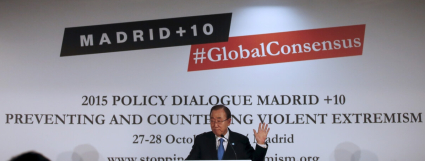A senior Conservative MP has warned that the Government's flagship 'Prevent' strategy against Islamic extremism is "a significant source of tension" among Muslims living in Britain.
The strategy, devised by Theresa May when she implemented the Counter Terrorism Act a year ago as Home Secretary, is criticised in a new report into job prospects among Muslims by the cross-party women and equalities committee in Parliament.
Maria Miller, the group's Tory chair, said: "The challenges that the government faces in tackling extremism cannot be underestimated but in the course of this inquiry we came across individual Muslims who were reluctant to speak to us for fear that our inquiry was part of the Prevent programme. The Prevent strategy was cited as a significant source of tension by a number of participants."
The report, titled 'Employment Opportunities for Muslims in the UK', points out that there is a 12.8 per cent unemployment rate among the UK's 2.7 million Muslims, compared with 5.4 per cent for the general population.
It says: "In the course of this inquiry we came across individual Muslims who were reluctant to engage with us for fear that our inquiry was part of the Prevent programme. During our visit to Luton, Muslim participants told us Government interventions made them wary and that they felt they were being treated as a suspect community. The Prevent strategy was cited as a significant source of tension."
Haras Rafiq, of the Quilliam think tank which focuses on counter-extremism, defended the Prevent strategy. "Prevent was not set up to deal with social cohesion and inequality. It was set up purely and simply to prevent further terrorist attacks after July 7 [2005]," he said. "In the purest sense, it has done what it was set up for."
Rafiq added that Prevent needed to be better presented. "It needs better explanation from government to explain what it is and what it isn't. People think that it's about spying or social cohesion, and it is not."
The report does not call for the Government to abandon the Prevent programme. Instead, it makes 19 recommendations for ways to overcome discrimination at work and improve the job prospects of Muslims. These include making sure that employers are made aware that discrimination against an applicant on the grounds of religion is illegal.














